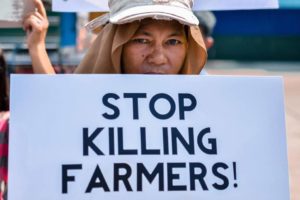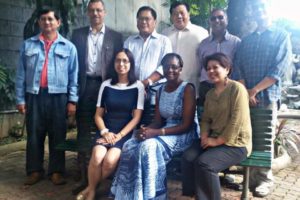For IBON International, this time of health, economic, and indeed, a “development crisis,” requires turning away from merely supporting the old economic and development paradigms, including in financing, and putting sustainable development into practice.
Today’s recession sparked from the longer-term crisis tendencies of the world economy, as the years after the 2008 crisis plodded with slow growth and along stubborn neoliberal economic and financial policy norms. With the concurrent pandemic accelerating the economic slump, worsening unemployment and widening socio-economic inequalities fell heavily on working peoples, especially on women.
In the current global development agenda, the important questions are around the “means of implementation”, that is, how to finance development, together with accompanying policy norms. Answering these today happen in conditions where big, profit-oriented corporations and banks continue to be major actors; neoliberal policies remain; and with state repression targeting civil society and people’s organisations in many countries. If such a trajectory is left unchanged, international policy would concede even greater power to corporate giants, driving wider inequalities, gaps in social services, and further obstacles to people’s economic rights and development on the ground.
One international arena for such questions is the Financing for Development (FfD) Forum of the United Nations Economic and Social Council, where many civil society organisations (CSOs), calling for a minimum of concrete but ambitious commitments to address today’s development challenges in terms of development cooperation, debt, trade, among others, were faced by undemocratic processes.
For IBON International, this time of health, economic, and indeed, a “development crisis,” requires turning away from merely supporting the old economic and development paradigms, including in financing, and putting sustainable development into practice. We are concerned that the Outcome Document of the recent FfD Forum follow-up is vague on its commitments, but more importantly, insufficient in ambition and renders silent the need for necessary systemic changes. It downplays the deeper roots of today’s crises in the pre-pandemic economic systemand beyond the Coronavirus disease (COVID-19) pandemic.
A need for more ambition
The “backsliding” in key development areas requires ambitious actions by the international community to shift away from big commercial actors’ interests in aid, debt, trade, and other issues.
Indeed, the “backsliding” in key development areas requires ambitious actions by the international community to shift away from big commercial actors’ interests in aid, debt, trade, and other issues.
As left unmentioned in the FfD Outcome Document, urgent challenges that block improvements in development cooperation, as well as the quantity and quality of aid flows, must be addressed, such as persisting tied aid and the use of aid to “catalyse” profit-oriented finance. Debt relief today requires more ambition to break from creditors’ interests, instead of merely lauding G20 and IMF-World Bank efforts which remain insufficient and problematic.
The blanket “open markets” doctrine is overdue of a re-examination, amid calls to replace the WTO with a trade system that protects peoples’ economic rights. The Outcome Document is silent on how blanket trade and investment liberalisation has reduced people’s access to “flow of vital medical supplies, [and] critical agricultural products”. Beyond a focus on resolving “disruptions” in corporate-driven value chains, commitments to protecting Southern workers’ rights are foundational, especially for working women. For instance, garment workers in Asia who are largely comprised of women, are hard hit by threats of layoffs, after decades of poverty wages as corporate brands scrambled for cheaper labour costs.
Development today must be even more founded on climate justice and ecological principles, as the climate emergency persist with the recession and pandemic. The Outcome Document is silent on the decades of corporate resource extraction that not only wrought the burdens of climate impacts, but also created unsustainable systems of production and consumption that destroy ecosystems and violate, among others, Southern farmers’ and Indigenous Peoples’ rights. Support for climate change mitigation and adaptation must shift from largely being loans towards grants amid Southern debt distress.
The corporate capture of development behind the insufficient ambition
IBON International deplores the continuing corporate capture of development and the declining state of people’s rights today. We are concerned that the “private sector,” usually dominated by multinational corporate giants at the expense of domestic medium and small enterprises, remains to be regarded as major stakeholders for “achieving the SDGs”, in short-term pandemic responses, and long-term economic measures. This is in the name of the “growing interest in sustainable investment”.
It is the Forum’s own evidence-based resource, the Financing for Sustainable Development Report, that shows how corporations refer to the SDGs but are not serious in measuring their concrete practices; that the current push for “sustainable investment” is compromised by how the SDGs have been used as a “marketing tool;” and that majority of the world’s biggest multinational corporations do not actually operate with human rights concerns in mind.
Endorsement of big business is all the more questioned today: amid widening inequalities, as even some ultra-wealthy capital holders benefit from speculation and bailouts during the pandemic, while already low-waged workers in the global South face increasing precarity; and amid capital-holders’ volatile caprices that left developing economies dry from sudden outflows. The Outcome Document unfortunately reproduces the hype over so-called “emerging technologies for sustainable finance”, and for e-commerce, while neglecting that the big private sector dominates, and is profiting from, current monopoly on such technologies.
We recall that it is the Forum’s own evidence-based resource, the Financing for Sustainable Development Report, that shows how corporations refer to the SDGs but are not serious in measuring their concrete practices; that the current push for “sustainable investment” is compromised by how the SDGs have been used as a “marketing tool;” and that majority of the world’s biggest multinational corporations do not actually operate with human rights concerns in mind.
Radical systemic reforms, democratic development processes needed
IBON International asserts that, now more than ever, democratised national and international development processes are necessary. We decry how the Outcome Document was negotiated “behind closed doors” in virtual platforms. This shows the extent of challenges in realising the people’s right to substantively shape development paths nationally and internationally, which require significant people’s participation and democratic processes.
Also left unrecognised are the realities of international financial institutions’ influence in national development and financing strategies in the name of “technical expertise,”[1] and the fact of democratic erosion and attacks against CSOs and people’s organisations, from harassment to killings—which both challenge the possibilities of democratically-owned national plans and financing frameworks in the global South.
Strong commitments to working women’s civil-political, social and economic rights, including addressing the unequal burdens of household and care work, will be key in addressing the gendered aspects of development, including of women’s participation in shaping development agendas nationally and internationally.
The prospects of achieving a truly sustainable development, led by and for working peoples, need more than the FfD Outcome Document’s orientation of enabling the pre-pandemic economic system’s recovery.
IBON International also asserts that the prospects of achieving a truly sustainable development, led by and for working peoples, need more than the FfD Outcome Document’s orientation of enabling the pre-pandemic economic system’s recovery.
Today’s systemic challenges are the historically business-oriented international policy and the drive for private finance to significantly shape the development agenda. Setting the economy “on a more sustainable pathway” is incoherent with, and impossible while, policies rest on the unabashed capital accumulation during and after the current crises. It is therefore not surprising that CSOs are calling for an International Economic Reconstruction and Systemic Reform Summit to heighten the ambition of international response.
Instead of “reimagining capitalism,” as said by a Citigroup representative in the 23rd of April informal virtual meeting of the FfD Forum, IBON International asserts that it is crucial to reclaim economic sovereignty in the global South, towards strategic industrial policy and rural development, for economies not reliant on the forces of foreign capital-holders, but are self-reliant enough, and with dynamism in domestic economies, to provide for people’s needs in times of crises and otherwise.
To “protect human rights for all and ensure that no country or person is left behind”, there is a need to reverse decades of privatisation, investment liberalisation, and Southern integration into volatile financial markets that largely shaped these challenges. These include a need for international norms that allow capital controls and debt repudiation;that contribute to addressing illicit financial flows and progressive domestic resource mobilisation.
It would entail claiming economic sovereignty from monopoly capitalism and neoliberal policy. ###
***
[1]For national level processes, the Outcome Document only makes vague references that “progress” is made in “developing integrated national financing frameworks (INFFs) in support of their nationally-owned sustainable development strategies.”


